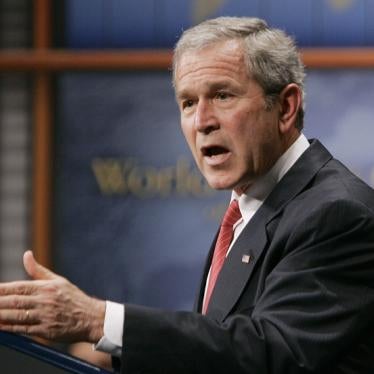President Obama's policy toward the Bush administration's use of torture has been one of splitting the difference - Obama ordered an end to further torture but largely avoided investigating, let alone prosecuting, what Bush administration officials had done. For the Obama administration, the calculation was political: Stopping ongoing criminality by US officials was non-negotiable, but delving into the criminality of his predecessor was deemed too costly. Obama had other priorities - fixing a devastated economy, enacting health-care reform - so dredging up the crimes of the previous administration was seen as too distracting and too antagonistic an enterprise when Republican votes were needed.
So the president adopted the mantra that he would "look forward and not backwards." Under Obama's watch, US interrogators would not torture suspects or send them abroad for others to torture. There would be no more twisted legal justifications for torture, no more cheap euphemisms such as "enhanced interrogation techniques." But there would also be no investigations into this ugly chapter of American history.
The sole exception was a narrow investigation entrusted to special counsel John Durham, which examined interrogators whose cruelty had exceeded authorized interrogation techniques. That inquiry ended last month with a decision to investigate two deaths of terrorism suspects in CIA custody but not some 100 other cases of alleged abuse. The crux of the problem, however, was never excessive torture; it was authorized torture. Khalid Sheik Mohammed, for example, was ordered subjected to "waterboarding" - a form of mock execution by drowning - 183 times. That was the issue - not that some freelancing interrogator might have added a 184th.
Obama's deliberate suppression of this shameful past is wrong. It reflects bad policy, a dereliction of presidential responsibilities and a continuing disregard for international law.
It treats torture as a policy option - one that can be turned on or off at presidential will. Obama prohibited the practice, but by refusing to underscore its criminality through prosecution, he leaves the door open for future presidents to resume torture when the next security challenge arises. Indeed, far from "moving on," Obama's critics in Congress have attacked his decision to reject torture; some have proposed exempting the CIA from Obama's order that all US interrogators abide by the US Army's interrogation manual prohibiting such techniques.
Obama has also adopted an unduly narrow view of his duties toward criminal law. It's not enough for a president to respect that law; he is also responsible for enforcing it. Through his attorney general, a president is prosecutor in chief, but Obama has ordered Eric Holder not to pursue the Bush administration's serious and systematic crimes against detainees. That tacit acceptance of the past weakens this essential criminal prohibition.
Indeed, Obama's inaction places the United States in violation of its international legal obligations. The UN Convention Against Torture, ratified by the United States and 146 other countries, as well as the Geneva Conventions, do more than prohibit torture at all times, even in war. They also require that torture be investigated and prosecuted. The duty to prosecute is no more optional than the duty not to torture. Yet Obama is picking and choosing among these legal mandates.
That serious breach of international law has consequences well beyond America's shores. The US government regularly presses other governments to prosecute their torturers, but it does obvious damage to US credibility when the United States won't prosecute its own. That refusal also endangers US service members or intelligence agents who might be captured by a hostile government, since the United States undercuts its ability to insist on prosecution of anyone who subjects them to waterboarding or other torture techniques.
There is no shortage of evidence that senior Bush officials, including the former president, ordered torture. Human Rights Watch is releasing a report Tuesday collecting the voluminous evidence, including admissions by Bush and others. It is time to act on this evidence. That may be politically difficult, but the viability of the fundamental prohibition of torture is too important to be cast aside for political convenience.








